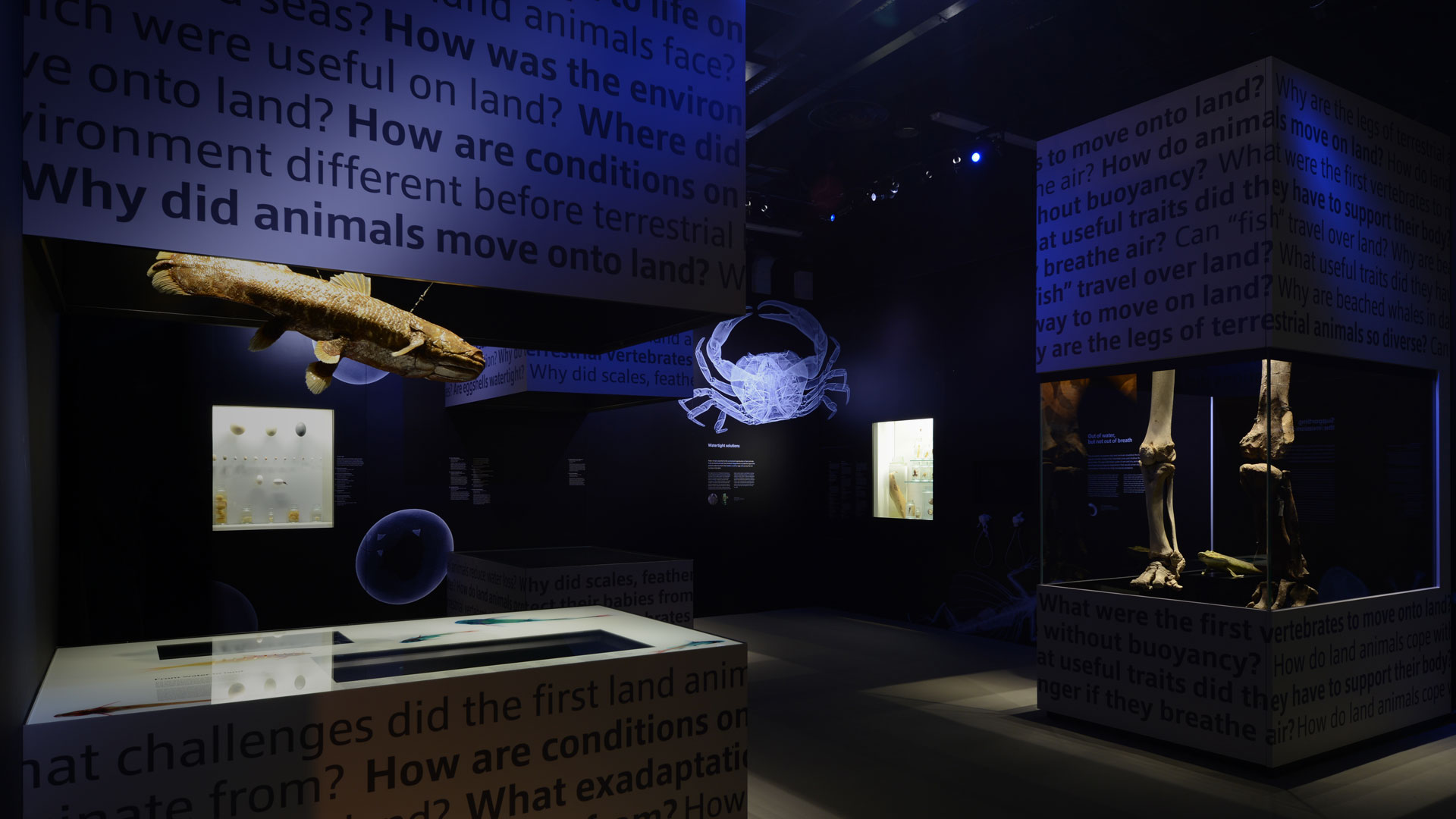Specialist Surgeon by Day, Expert Entomologist by Night: An Interview with Dr Francis Seow-Choen
Written by Wu Ningjing
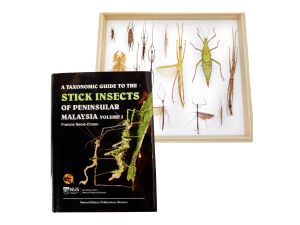
Dr Francis Seow-Choen, LKCNHM Honorary Research Affiliate’s latest book on display with some stick insect specimens. Photo credit: Wu Ningjing / LKCNHM
Published earlier this year, “A Taxonomic Guide to the Stick Insects of Peninsular Malaysia: Volume 1” is the tenth book on stick insects by LKCNHM’s Honorary Research Affiliate, Dr Francis Seow-Choen. This title is the latest in his series of taxonomic guides to the stick insects of Southeast Asia. The first in the series, focusing on Borneo, was published in 2016. Since then, he has published a book every year, totalling to a whopping seven books! Did we mention that he is a specialist colorectal surgeon by day? Despite his busy schedule, Dr Seow-Choen was generous enough to host a public webinar with our museum. We were also honoured to chat with him about his latest book and love for stick insects.
From Our Own Backyard
Dr Seow-Choen first got interested in stick insects after a visit to Malaysia in his youth. He had never seen so many insects in the wild before and was amazed by the curious critters. On his motivations for starting the series on stick insects of Southeast Asia, he says, “After having spent so many years, about 30 years or so, studying stick insects and not writing anything, I thought I should try and document on these things and start doing serious taxonomy work… I felt that I should do as much as I can (and) as fast as I can.”
In his latest book, Dr Seow-Choen described 14 new species. Despite the relatively well–studied fauna of Peninsular Malaysia, Dr Seow-Choen had his reasons for focusing his work there for this book. “So, a lot of people ask me, ‘why don’t you go to the Amazons?’ And I thought oh, we should start in our own backyard!”
The book, like the past volumes, is furnished with gorgeous colour photographs of the insects described. More than just a taxonomic publication, the book serves as a guide for the identification of the stick insects of Peninsular Malaysia. “I want to not just describe new species and new genera, but also have photographs of the insects alive in the book. Because dead dried-up specimens may not give people the exact impression of what the insect looks like in the wild. It helps (one to) understand their habitat and ecology, not just you know, a plain description based on a dead specimen.” Dr Seow-Choen reflected.
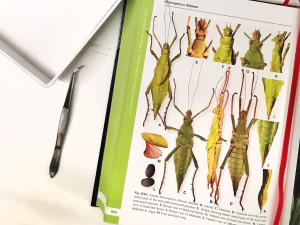
A page from Dr Seow-Choen’ latest book, “A Taxonomic Guide to the Stick Insects of Peninsular Malaysia: Volume 1”. Photo credit: Maimon Hussin / LKCNHM
Biodiversity Hotspot
Dr Seow-Choen recalls that when he first became interested in stick insects in the 90s, little was known about them in Singapore. Since then, Dr Seow-Choen has documented up to 43 species of stick insects in Singapore. “Southeast Asia is a biodiversity hotspot. Even Singapore, you know, the diversity of plant life is quite amazing, if we really look into it carefully,” quips Dr Seow-Choen. Unlike ants or flies, stick insects are picky eaters and often rather localised. “They’re very specific in their food and plant requirements.” According to Dr Seow-Choen, there are a surprising number of species of stick insects found only in Singapore and not in other Southeast Asian regions. There is also a lot of speciation (the formation of new and distinct species) in Southeast Asia. “We have very, very small species but also a very huge, sizable species.”
One such sizable species is Heteropteryx dilatata. Females of the species can reach 17 cm in length and weigh up to 65 g—it is one of the heaviest insects in the world! Brightly coloured and adorned with spines, this stick insect was previously found in Singapore and is a favourite among many bug lovers, but unfortunately is extinct in the wild locally.
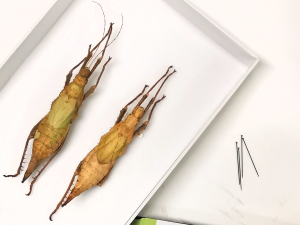
Dried specimens of Heteropteryx dilatata. Photo credit: Maimon Hussin / LKCNHM
Dr Seow-Choen hopes that the beauty of stick insects can help people be more in touch with nature. “A lot of people are scared of ants or cockroaches, these harmless stick insects are a good way of introducing them to the natural world… (T)here’s a lot of things to be discovered, not just in our shopping centres but our forest as well.”
Good Collaborators “Stick” Together
Published during the pandemic, Dr Seow-Choen admits that Covid-19 actually accelerated the process of his latest book. “I couldn’t travel and therefore I had to do some writing”, he laughed, “I had to make do with whatever specimens I already have.” Dr Seow-Choen stresses the importance of collaboration in his taxonomic research. His friends in Peninsular Malaysia managed to obtain specimens for him when he could not travel and researchers in Europe would help him photograph and measure specimens unavailable to him. “Every scientist builds on the work of another one.” He reveals that many of the new species he discovers were named after people who have helped him.
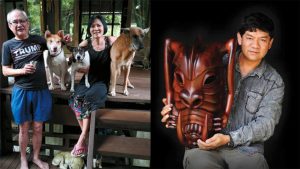
Dr Francis Seow-Choen’s friends in Peninsular Malaysia, Ms Lee Su Win and Mr Philip Leong (left), along with Mr Wong Tet Seng (right), who assisted him greatly by collecting stick insect specimens during the pandemic when Dr Seow-Choen was unable to travel. Photo credit: Dr Francis Seow-Choen
A Sticky Passion
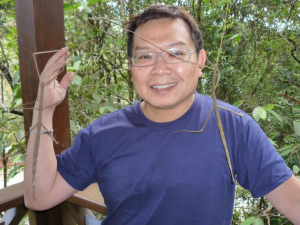
Dr Seow-Choen with his beloved stick insects. Photo credit: Dr Francis Seow-Choen
Dr Seow-Choen might be the only person in the world with expert knowledge on both colorectal surgery and stick insects. We wondered if Dr Seow-Choen’s work on stick insects has helped him in the field of medicine as stick insects can heal from injuries by regrowing a lost leg, and have been used in traditional medicine. “I’m studying them for their own sake, not trying to relate them to surgery,” he divulged, “I’m a full-time surgeon… but studying stick insects is my hobby. It is just one endeavour I have as a citizen of this world.” Despite having no qualifications in Zoology, Dr Seow-Choen‘s research and authority on stick insects earned him the title of Fellow of the Royal Entomological Society, with the privilege of adding the title ‘FRES’ behind his name.
When asked for inspiring words for budding scientists, Dr Seow-Choen advised, “The first step is always the hardest… (W)hatever you are interested in life, be it insects or fish or reptiles, take the first step!”

